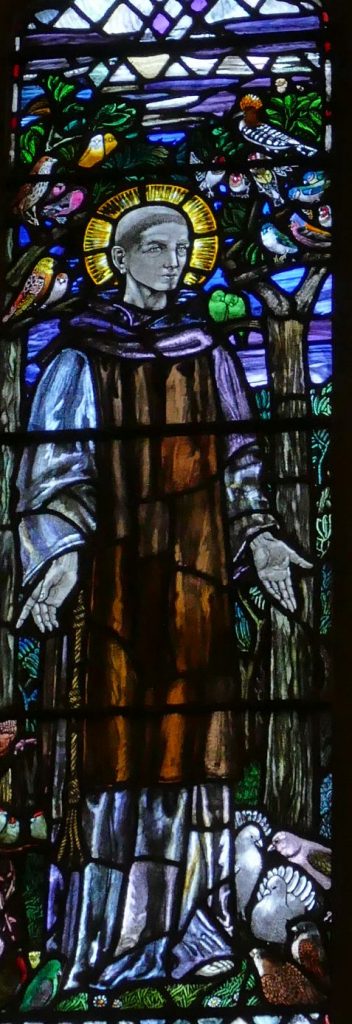
St Francis window in St Leonard’s church, Wollaton, Nottingham.
Artist Christopher Whall. Image copyright Stephen Craven 2020.
Today’s hymn from Sing Praise is “Earth, earth, awake!” by Herman G Stümpfler Jr. I’m grateful to John for suggesting the tune ‘Lasst uns erfreuen’ (better known set to St Francis’ Canticle of Creation) rather than the one in the book; I enjoyed singing the harmony to the alleluias in the YouTube video.
This is very much an Easter hymn of praise. As I observed yesterday, in the Easter season we are reminded that Christ’s resurrection revealed on Easter day was as like a new morning for the world.
The first verse invites the whole creation – earth, sun and stars – to awake and sing praise to the risen King. The second invites us to join all nature as it “sings of hope reborn [as] Christ lives to comfort those who mourn”. This weekend of course, our nation mourns its senior Prince, who has passed into Glory honourably and of natural causes at the ripe old age of 99, but there will be many people also who are mourning for those who have died young, in tragic circumstances or of Coronavirus or other diseases. Their grief may be deeper, and their acceptance of their loved one’s death longer, than when a death was expected and natural. But whatever the circumstances, may they know God’s comfort.
Verse three makes the common comparison between winter turning into spring, and the new life of the resurrection. Whilst the first Easter did happen around Passover time in April, there is a very long-standing tradition of making this link with the time of year when flowers and buds appear and animals give birth (at least in the northern hemisphere where Christianity started). The final verse is a song of praise to the Trinity (see yesterday’s comments).
I wasn’t quite convinced by this hymn. The repetition of the first word was, to me, a bad sign: surely if the hymn begins with the sentiment “Earth awake” then those should be the opening words, without needing to invent an extra dummy syllable? I think it’s very hard to write a hymn in which “Alleluia” really sounds convincing at the end of every line (that’s to say, in which the natural sense of the words comes to a full stop at the end of every line), and sure enough the lines of verse 2 don’t stand individually on their own. I think verse 3 (and, to a lesser extent, the first line of verse 1) suffers from “Northern Hemisphere Myopia” – that’s to say, it confuses springtime with resurrection. (I ask myself what sense the hymn would make in, say, Tasmania where March-April is autumn?) And I think it’s a pity when the persons of the Trinity have to be put in the wrong order to make the rhythm work, as in the first line of verse 4.
My main difficulty with the tune was also rhythmical: if the words really are to be supported, surely the major stresses of each line after the beginning fall on the sixth syllable, not the eighth? And therefore the “Alleluia” needs to have a quick “al-le”? I’d therefore have written the note-values as 2-1-1-2-2-1-1-1-0.5-0.5-2-2 so as to get syllable 6 on the downbeat of the next bar, rather than 2-1-1-1.5-0.5-1-1-2-1-1-2-2 as set out in the music. I wrestled with this for a while before deciding that discretion was the better part of valour. As I did so I was sure Stephen would lament my once again abandoning a set tune in the book and going for an old familiar instead (particularly as my voice didn’t carry the Alleluias very well!), and I was most surprised to read his appreciation above!